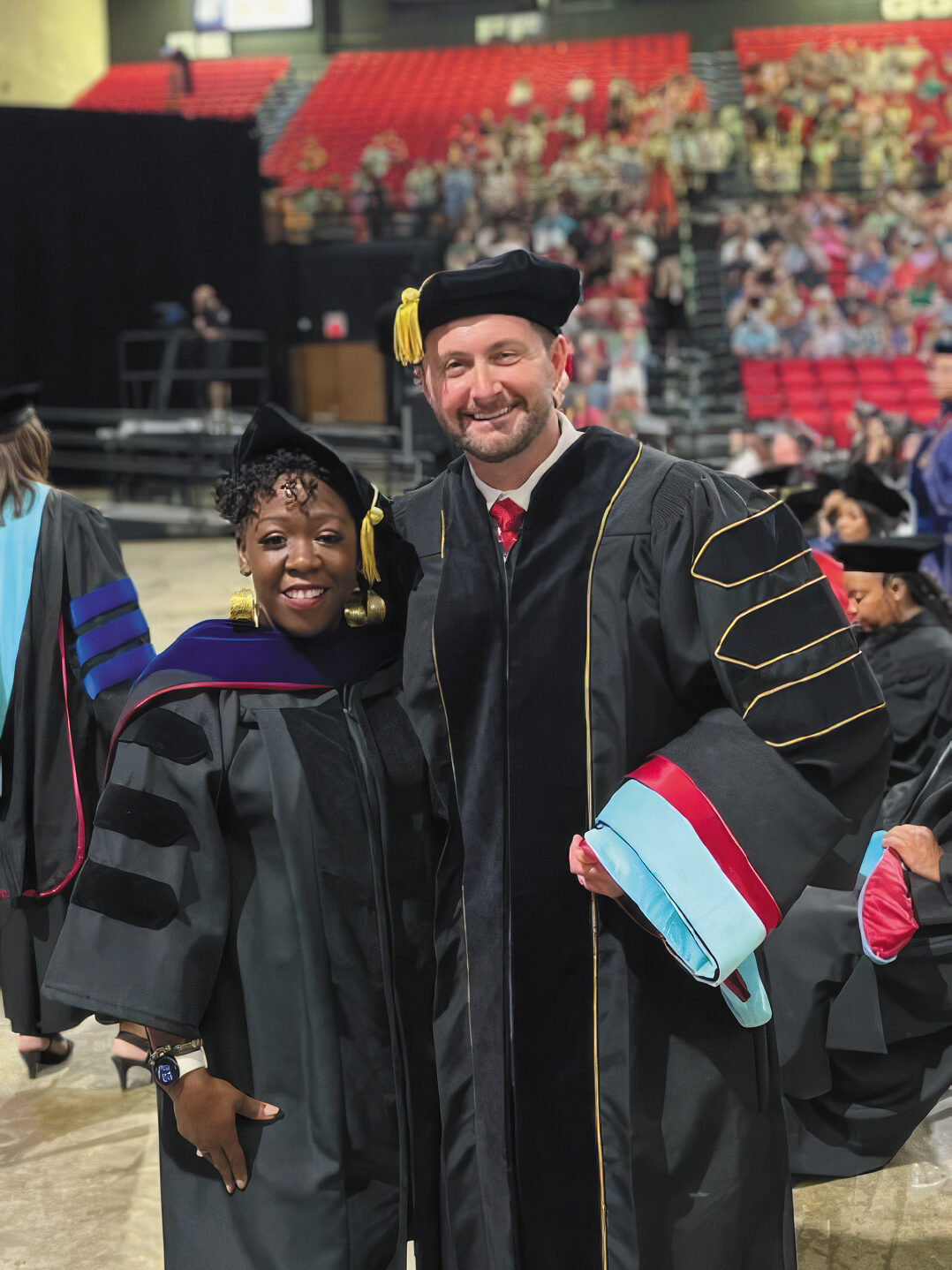Viewpoint: January 2024

PHOTOS COURTESY OF JASON REEVES
An educator’s life revolves around learning. But are we ourselves lifelong learners? Do we stretch beyond our comfort zones periodically to expand our learning? Whether it’s a conversation with a friend or colleague over a topic we don’t understand or with whom you may not agree or targeted professional development designed to develop new skills or the hard-won pursuit of an advanced degree, all of these are examples of lifelong learning. We may experience each one at various times in our lives, but they all contribute to our growth in unique ways.
For me, such growth happened recently and is something I would not have thought I could ever accomplish. In 2023, I successfully defended my doctoral dissertation and had the honor of walking across the graduation stage in August. My journey represented much more than a single accomplishment. It culminated in building new skills and self-confidence and allowed my 11- and 14-year-old daughters to see the importance of setting your mind to something you want to accomplish—and accomplishing it. Just as important, it has provided me with a knowledge base that enables me to help teachers reduce technology-induced stress and burnout.
Preparing for the EdD Journey
Everyone has their own reason for pursuing higher education. Mine initially was to set myself apart from others as I pursued leadership positions. I recognized that the higher you move up, the greater the competition. However, I see now that I was short sighted in my views as to what a doctorate could do for me given that earning it has provided so much more than I dreamed. From improved communication skills to stronger analytical, problem-solving, critical thinking, and interpersonal skills, this degree has made me a better leader and learner.
I realized early on that I would need to devote an extraordinary amount of time to this pursuit. My dissertation chair gave me two great pieces of advice during our first class back in 2020. The first piece of advice was to be willing to make sacrifices to earn this degree. Successfully completing your doctorate requires sacrificing time for work, family, sleep, and leisure. For instance, I’m a morning person, and I didn’t want to take time away from my family with my studies, so I got up every morning at 4:15 to begin my day. I spent that time on concentrated work before everyone else started to get up. For me, this adjustment to my schedule and the discipline to stick with it were key to successfully completing my doctorate. In their book, Extreme Ownership: How U.S. Navy Seals Lead and Win, Jocko Willink and Leif Babin discuss how discipline equals freedom. For me, the discipline to have early morning work time provided me with extra freedom in how I chose to spend the rest of my day.
The second piece of advice was to focus all my work in my doctoral core classes around my dissertation topic. By pulling articles for papers, projects, and research that were focused on my topic, I slowly began to build a large library of research to begin my dissertation. Following this early advice allowed me to jumpstart my research since I had already created a foundation of peer-reviewed articles from which to learn. Being able to focus your research early on toward your dissertation topic only happens if you narrow down your topic in the early stages of the program. The problem is, of course, that choosing your dissertation topic can be daunting.
Choosing an Area of Focus
I have visited with numerous doctoral students since I began my journey. What I have found interesting is the difficulty many have with choosing their topic. It is difficult because of the level of commitment one is about to make; it almost feels like asking someone to marry you. Tweaking your focus during the process is one thing, but completely changing a topic is something that you want to avoid if possible. Part of the issue is that you don’t know what you don’t know.
You don’t know what to avoid or what to focus on when choosing the topic. You want to avoid choosing a topic because you think it will be easy to get information or data on it. Avoid choosing any topic you consider boring or one in which you have no real interest. You also want to avoid an area of research so new that there simply is not much in the way of available research. What you choose will be your area of expertise moving forward. Pick something you have a desire to know more about and that you feel enthusiastic about. Focus on a topic where there is a decent body of work already available but not necessarily in the area you want to focus in. Think of choosing a dissertation topic like a 1,000-piece jigsaw puzzle where you only need to find one piece.
Being able to focus your research early on toward your dissertation topic only happens if you narrow down your topic in the early stages of the program. The problem is, of course, that choosing your dissertation topic can be daunting.
I chose something I believed to be relevant now and in the future. I also wanted my topic to incorporate some aspects of leadership. When I began my doctoral program, I watched as teachers in my state were struggling with virtual instruction. Like every other state, Arkansas was trying to mitigate the spread of COVID-19 and determine if in-person school was safe. Teachers who specialized in face-to-face instruction were suddenly required to facilitate class via Google Classroom and Google Meet. You can imagine the state of shock and stress they were experiencing. Technology-induced stress is not something new, but for K–12 educators it was. The topic of employee well-being has always intrigued me, and I believe leaders should look out for and help those they serve. That belief, combined with the increasing role of technology in education, meant that I had found my area of research.
To focus my efforts, I sought the help of Stacie Wood, a colleague who completed her dissertation a year earlier. Her focus was on an administrator’s inability to disconnect from their job due to the accessibility of technology. She discussed her process with me and gave me the official name of technology-induced stress: technostress.
Understanding Technostress

While my dissertation goes into great detail about technostress, I’ll give a brief overview here. Simply put, technostress is the inability to cope with information and communication technology (ICT) and the changing requirements tied to ICT usage, which causes fear, anxiety, and stress. Clinical psychologist Craig Brod coined the term in 1984. Research has identified five specific techno-stressors: techno-invasion, techno-complexity, techno-uncertainty, techno-overload, and techno-insecurity. I define them below:
- Techno-invasion: the ability of ICT to cause users to be constantly connected and reachable at any time, blurring the boundaries between work and home.
- Techno-complexity: the feelings of inadequacy that users feel about their need to spend time and effort to learn and develop new skills to use ICT.
- Techno-uncertainty: the uncertain feeling that users have from constant changes and upgrades in ICT.
- Techno-overload: the ability of ICT to force users to work faster and longer than they are accustomed to.
- Techno-insecurity: the fear of possible job loss associated with new ICT or better-trained staff.
People in various occupations experience techno-stressors differently. To understand how K–12 educators were experiencing it, I used the reliable and validated Technostress Measurement Tool, which consists of 23 questions on a 1–7 frequency scale. To measure burnout, I used the adapted Burnout Measure: Short Version created by Malach-Pines (2005). By measuring each of the five techno-stressors as well as teacher burnout, I determined which, if any, of the techno-stressors correlated with teacher burnout. This finding is important because it provides an area of focus for teachers and administrators to minimize the negative impact of technology.
Adding to Teacher Burnout
According to my research, rural high school teachers in Arkansas did suffer from burnout and experienced three of the five techno-stressors: techno-uncertainty, techno-overload, and techno-invasion. However, a more comprehensive look at the data revealed that three of the five techno-stressors (techno-insecurity, techno-overload, and techno-invasion) demonstrated a positive correlation with teacher burnout. What does this mean for us as leaders?
Understanding the areas of technology use that impact teacher burnout allows school leaders to be intentional in their actions to minimize technostress and reduce teacher burnout. For example, when it comes to techno-insecurity, leaders must focus on professional development that is relevant and enable teachers to communicate with colleagues so they can help one another with technology concerns.
Establishing organization norms concerning email use can mitigate techno-overload and techno-invasion. Techno-overload is generally attributed to an individual’s email load. School officials can lower email traffic by focusing school emails only on business communication. They can also encourage a different communication platform for non-business-related communication among teachers, such as text messaging or face-to-face discussions. Excessive email traffic often causes teachers to adjust their working habits or lengthen their workday in an effort to sort through, process, and respond to various emails they receive daily. Schools can minimize techno-invasion by establishing response time norms to be shared with parents and students. Teachers often feel the need to respond to email correspondence from parents and students as soon as possible. By establishing a 24-hour response time for emails, with teachers not responsible for responding to emails after school hours and on non-workdays, teachers will feel free to unplug while away from work. These are just a few small ways to help reduce technostress.
Taking Care of Teachers
K–12 education is one of the most stressful occupations—and one of the most rewarding. Between legislative policies focused on teacher accountability, vocational influences, and an individual’s personal characteristics, the causes of teacher stress leading to burnout are numerous. Recognizing the ways technology has added to this stress, and working to minimize it, has become more important than ever. As leaders, it is our job to look out for our teachers and provide them whatever they need to reach our students—even if that means stretching ourselves to learn about a quiet phenomenon that, if left unaddressed, could be adding fuel to the fire of teacher burnout and attrition.
Jason Reeves, EdD, is the assistant principal of Alma High School in Alma, AR, and the 2023 Arkansas Association of Secondary School Principals Assistant Principal of the Year.
References
Ahmad, U. N. U., & Amin, S. M. (2012). The dimensions of technostress among academic librarians. Procedia, Social and Behavioral Sciences, 65, 266–271. doi.org/10.1016/j.sbspro.2012.11.121
Brod, C. (1984). Technostress: The human cost of the computer revolution. Basic Books.
Ragu-Nathan, T. S., Tarafdar, M., Ragu-Nathan, B. S., & Tu, Q. (2008). The consequences of technostress for end users in organizations: Conceptual development and empirical validation. Information Systems Research, 19(4), 417–433.
Tarafdar, M., Tu, Q., Ragu-Nathan, B. S., & Ragu-Nathan, T. S. (2007). The impact of technostress on role stress and productivity. Journal of Management Information Systems, 24(1), 301–328. doi.org/10.2753/MIS0742-1222240109
Wang, X., & Li, B. (2019). Technostress among university teachers in higher education: A study using multidimensional person-environment misfit theory. Frontiers in Psychology, 10, 1791–1803. doi.org/10.3389/fpsyg.2019.01791
